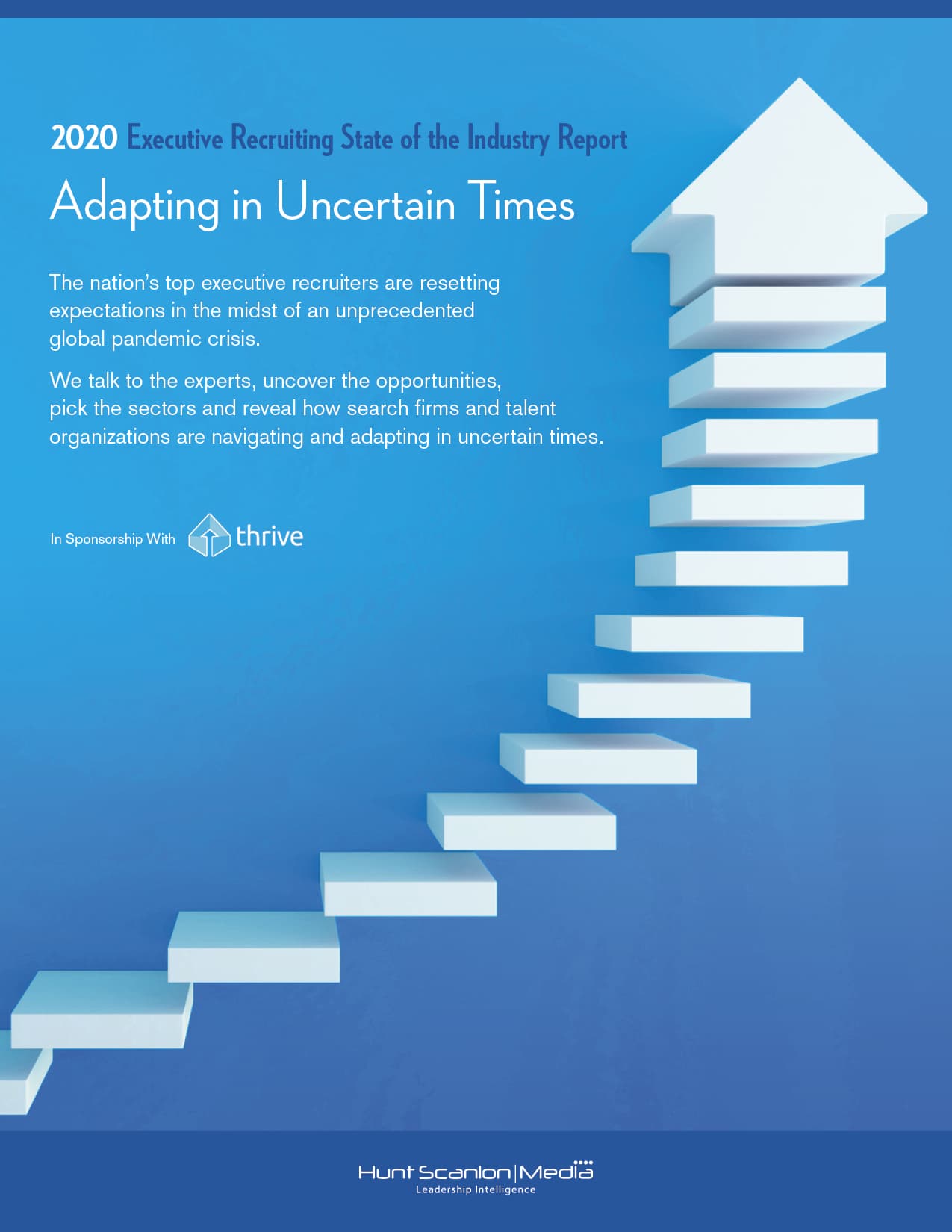CEO Confidence Falls to Lowest Levels Since 2008 Great Recession

April 15, 2020 – Amid the fallout from COVID-19, confidence among U.S. CEOs has declined sharply. The Conference Board Measure of CEO Confidence decreased from 43 in the fourth quarter of 2019 to 36 in the first quarter of 2020. In addition, a follow-up survey from late March to early April showed a further decline to 34. (A reading of more than 50 points reflects more positive than negative responses).
“In late March, CEO confidence declined to levels not seen since the height of the Great Recession,” said Lynn Franco, senior director of economic indicators and surveys at The Conference Board. “The sharp fall was driven by a dramatic deterioration in sentiment about the current state of the economy. So it comes as no surprise that more than 80 percent of these executives said COVID-19 has substantially impacted their business.”
 Executive Recruiters & Talent Leaders Navigate Uncertain Times
Executive Recruiters & Talent Leaders Navigate Uncertain Times
Hunt Scanlon’s latest executive recruiting industry sector report will be available in 30 days. This will be the most important search industry sector report that Hunt Scanlon has ever produced! The nation’s top executive recruiters are resetting expectations in the midst of an unprecedented global pandemic crisis. Many expect a significant pause in business, followed by a sharp rebound later this year. We talk to the experts, uncover the opportunities, pick the sectors and reveal how search firms and talent organizations are navigating and adapting in uncertain times. Healthcare, biotech, crisis response, supply chain & logistics and the vast private equity sector are all showing signs of strength – and a big need for talent.
Hear from top talent experts, including: Frederickson Partners; CBIZ CMF; Russell Reynolds Associates; Odgers Berndtson; Options Group; ZRG Partners; Wilton & Bain; Diversified Search; Caldwell; Hanold Associates; True Search; Slayton Search Partners; Coulter Partners; Cejka Search; Solomon Page; Acertitude; McDermott & Bull; Academic Search; Beecher Reagan; Bowdoin Group; Kingsley Gate Partners; Comhar Partners; ON Partners; Perrett Laver; CarterBaldwin; Stanton Chase; Buffkin/Baker; Major, Lindsay & Africa; WittKieffer; Klein Hersh; Furst Group; Invenias; PierceGray; LifeSci Partners & more!
Insert an ad in our report, reserve your copy today and find out how you should adapt your business in these uncertain times.
“Despite the overall decline in confidence and negativity about the present situation, by early April CEOs felt less pessimistic about the short-term outlook,” said Bart van Ark, chief economist at The Conference Board. “This suggests that while CEOs see brighter days ahead, they also expect to experience major consequences from the current crisis. For example, workers, profits, sales and investment activity will all take a hit, and such impacts could endure post-crisis.”
A Stark Shift in Sentiment
The Conference Board surveyed CEOs during two timeframes. A comparison reveals a striking shift in attitudes: CEOs’ pessimism soars; and the current state of the economy and their own industry.
Mid-February to mid-March: More than 70 percent of participating CEOs said the state of the economy had deteriorated compared to six months ago. And 55 percent said the state of their own industry had deteriorated compared to six months ago.
Late March to early April: By this point in time the economy had further deteriorated. As such, 97 percent of CEOs said conditions had deteriorated and were significantly worse than they were six months ago. And 92 percent said the same about the outlook for their own industry.
Why the increased pessimism? On March 26, the Department of Labor reported that in one week alone, 3.3 million Americans filed for unemployment insurance. In addition, by late March several states had already begun enacting various social distancing measures. Also, there were abundant signs showing a severe pullback in consumer spending.
COVID-19’s Impact and How CEOs are Responding
Mid-February to mid-March: Only about a quarter of CEOs felt that both the economy and their own industry would be better six months down the road.
Late March to early April: By this time, sentiment started to shift. Now, about half of CEOs foresee the economy and their industry improving six months from now.
“A more positive outlook is likely due to CEOs having had more time to digest the consequences of the economic fallout and develop plans for responding to it,” The Conference Board report said. “In addition, both the Federal Reserve and the U.S. Congress had enacted measures to help prop up credit markets, the economy, businesses and consumers.”
The Conference Board also noted that the CEOs who responded in late March and early April also weighed in on the business impacts of COVID-19, along with how they are reacting. More than 80 percent said their business has been, or will be, substantially impacted by COVID-19.
A Look at COVID-19’s Impact from Search Leaders
“This pandemic will certainly change the focus of governments and private industry towards more closely working together to change and develop the global healthcare system to be better prepared for future pandemics, as well to re-structure it to be more efficient,” said Marc Gouran, president and global practice leader at Solomon Page, a multi-specialty executive search firm headquartered in New York City. “We would guess that investment in all parts of the healthcare system, including providers of all kinds, payers, medical devices and most particularly in pharmaceuticals, biotech and vaccines will be substantially increased over both the short and longer term.”
 Managing Through the COVID-19 Pandemic
Managing Through the COVID-19 Pandemic
As the global coronavirus pandemic sends shock waves through our daily lives and the economy, businesses are working to navigate through the upheaval. With management teams facing tough challenges, Summit Leadership Partners offers a series of tips for responding to both this crisis and any highly volatile situation. It is worth a read.
“Recruiting the best talent and expertise will be a critical part of the ability of companies and institutions to meet the needs of a system that will be changing, expanding and working together in totally new ways, with large amounts of new capital investment to fund it,” Mr. Gouran said. “Executive search firms that specialize in those areas will certainly have lots of opportunities to work in partnership with the global healthcare and life science industry and help to facilitate the long-term changes that will no doubt take place.”
In many ways, the fallout from the crisis has been breathtaking. “Without a doubt we are experiencing extraordinary times,” said Bob Clarke, CEO of healthcare and insurance-focused search firm Furst Group. “Within the healthcare sector there dynamic changes that few could have predicted, or at the very least predicted the speed at which they are occurring. For healthcare providers they are finding themselves on the front lines of a battle the degree of which none have experienced.”
Related: Wilton & Bain CEO Reflects on Deeper Meaning of COVID-19
“We are hearing from leaders that while on the one hand they have trained for events just like this, there are also outside factors on the other hand that play a significant role in their ability to prepare for and lead through what is coming,” he said. “Deploying teams and caregivers is being done by the book. But they are hampered by incredible shortages of equipment and PPE and battling a foe without any tools in their belt with which to combat it.”
For many search executives, the pandemic has brought out the best of their so-called soft skills. “As the COVID-19 crisis has escalated, it has required recruiters to be both more responsive to and more sensitive of the needs of clients and the obligations to candidates,” said Paul Esselman, managing director and president of Cejka Search, which has provided recruiting services exclusively to the healthcare industry for more than 35 years. “At Cejka Search, our executive search teams quickly shifted gears to focus on balancing the importance of keeping the recruitment process for critical leadership roles moving forward, while helping our clients manage their calendars and communications, and fill in the gaps where client team members just don’t have the bandwidth during this challenging time.”
Many sectors of the economy will face difficult months ahead, said Leslie Loveless, CEO of Slone Partners. “Within life sciences, we will likely encounter some challenges in recruiting executive talent as many top executives maintain a sense of loyalty to their companies and teams and will not consider leaving a stable situation during uncertain times,” she said. “That will limit the talent pool, resulting in further heated competition for those qualified candidates who are available. Many companies will have to scramble and find innovative solutions to fill some of their open top-level positions.”
Related: Managing Through the COVID-19 Pandemic
Contributed by Scott A. Scanlon, Editor-in-Chief; Dale M. Zupsansky, Managing Editor; and Stephen Sawicki, Managing Editor – Hunt Scanlon Media











